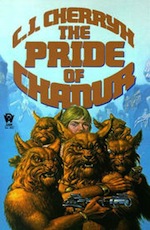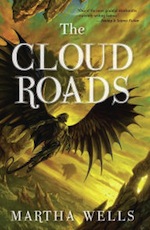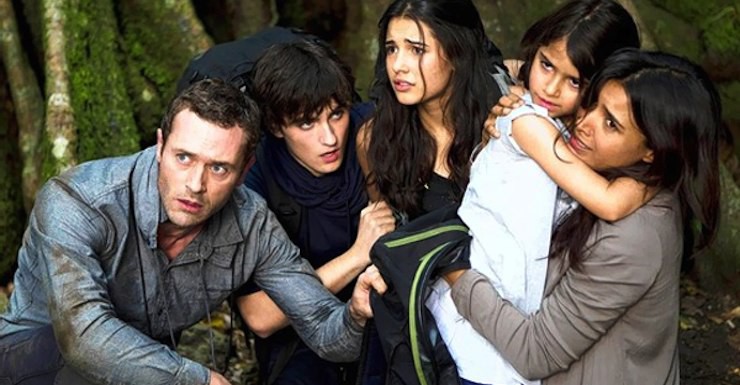The main character who is orphaned or has no significant contact with family (left behind, estranged, dead spouse or child as motivator, etc) shows up frequently in SFF novels, and understandably so: Such characters don’t have to take anyone else’s life or needs into account as their adventures unfold. It’s easy to just pick up and go when you don’t have anyone relying on you, or when your decisions don’t immediately impact the lives of people you care about.
I’ve written this kind of character myself, but with Court of Fives I specifically wanted to write a story in which the main character’s family is intact and present, and therefore plays a part as one of the complicating factors in her journey. What happens when a choice we need to make will hurt someone we care about? How much will we risk for those we love?
Here are five SFF stories complicated by the presence of intact and present family relationships.
The Pride of Chanur series by C.J. Cherryh
 A classic SF series from the 1980s that centers on a pride of lion-like humanoids, their trading business, and the trouble they run into and deal with in a corner of the galaxy filled with interesting alien species. The Compact is a fantastic piece of sfnal world building on its own, but the Chanur themselves hold a special place in my heart because the crew is (initially) all female given that EVERYONE KNOWS males are too unstable, emotional, and volatile to be good merchants. Considering how often as a teen and young adult I had to hear that women couldn’t do man-stuff-things because females were too emotional and unstable, you may imagine how much I enjoyed reading this when it came out. Once again I’m reminded what a toweringly creative and innovative figure Cherryh is in our field and what an influence she had on me as a writer.
A classic SF series from the 1980s that centers on a pride of lion-like humanoids, their trading business, and the trouble they run into and deal with in a corner of the galaxy filled with interesting alien species. The Compact is a fantastic piece of sfnal world building on its own, but the Chanur themselves hold a special place in my heart because the crew is (initially) all female given that EVERYONE KNOWS males are too unstable, emotional, and volatile to be good merchants. Considering how often as a teen and young adult I had to hear that women couldn’t do man-stuff-things because females were too emotional and unstable, you may imagine how much I enjoyed reading this when it came out. Once again I’m reminded what a toweringly creative and innovative figure Cherryh is in our field and what an influence she had on me as a writer.
Martha Wells’ Raksura stories
 Moon is alone in the world, a person without a past, clinging to dim memories of his dead mother and siblings. For years he has survived as well as he can, hiding his shape-shifting ability, trying to fit in . . . until the day a stranger finds him and recognizes what he really is. Besides the absolutely fantastic world building in this series, Moon’s journey of discovery detailing the kinship and friendship relationships he has to learn to understand and cope with is just unendingly delightful because Wells never loses sight of how complicated interpersonal connections are far harder for Moon to figure out and endure than basic survival. I love this series so much.
Moon is alone in the world, a person without a past, clinging to dim memories of his dead mother and siblings. For years he has survived as well as he can, hiding his shape-shifting ability, trying to fit in . . . until the day a stranger finds him and recognizes what he really is. Besides the absolutely fantastic world building in this series, Moon’s journey of discovery detailing the kinship and friendship relationships he has to learn to understand and cope with is just unendingly delightful because Wells never loses sight of how complicated interpersonal connections are far harder for Moon to figure out and endure than basic survival. I love this series so much.
Terra Nova
I didn’t think this 2011 series was great TV but it was often good and I liked it a lot (I never get tired of dinosaurs!), so I was sorry to see it canceled. I particularly loved that the story was built around the Shannon family and how their choices initially are driven by their desire to keep their family intact, and then later adapts to show them negotiating their changed circumstances without needing to artificially split them apart for “dramatic” reasons. As we watched Season One both my spouse and I discussed how unusual such a narrative choice seems in sff shows which are often dependent on people who function in isolation or with so few ties they apparently have no life outside their job, or within dysfunctional or absent or negative and combative family environments. I genuinely enjoyed seeing a loving, supportive family at the center of a series.
Michelle Sagara’s The Queen of the Dead Trilogy
 Few writers evoke the push and pull of family affection, duty, and loyalty as well as Sagara. This YA trilogy about a girl who discovers she can see and speak to ghosts builds such a powerful emotional punch that it made me cry more than once, and succeeded in getting me so wound up with tension that during one particularly fraught scene I had to stand up and walk around because I was shaking with anxiety. The bonds of family and friendship really shine in these books: People love each other, misunderstand each other, get exasperated and then apologize; they back each other up; they risk their lives out of compassion because it is the only way they know how to act and they do so in ways that never, ever, feel trite or easy. I guess I could say that this trilogy is about the ties that bind us, the very definition of how intact family relationships impact our lives.
Few writers evoke the push and pull of family affection, duty, and loyalty as well as Sagara. This YA trilogy about a girl who discovers she can see and speak to ghosts builds such a powerful emotional punch that it made me cry more than once, and succeeded in getting me so wound up with tension that during one particularly fraught scene I had to stand up and walk around because I was shaking with anxiety. The bonds of family and friendship really shine in these books: People love each other, misunderstand each other, get exasperated and then apologize; they back each other up; they risk their lives out of compassion because it is the only way they know how to act and they do so in ways that never, ever, feel trite or easy. I guess I could say that this trilogy is about the ties that bind us, the very definition of how intact family relationships impact our lives.
Shadowshaper by Daniel José Older
 This new (2015) YA urban fantasy novel is set in modern Brooklyn and does a fantastic job of creating the rhythm of those streets in a way that feels utterly real to me as a reader. As well, he provides a stellar example of how extended kinship relationships can be used to underpin and complicate a plot. Main character Sierra lives with her mother, father, and (invalid) grandfather; her brothers are grown up and out of the house but not out of the picture; she has important connections (sometimes positive, sometimes negative) to her aunt and godfather as well as to those of her relatives who have passed on; she hangs out with a believable circle of friends. As a budding artist, Sierra discovers a secret history of powerful forces that has been hidden from her, and how she has both a gift and a responsibility to carry on a tradition. Older never loses sight of how the past still works in the present.
This new (2015) YA urban fantasy novel is set in modern Brooklyn and does a fantastic job of creating the rhythm of those streets in a way that feels utterly real to me as a reader. As well, he provides a stellar example of how extended kinship relationships can be used to underpin and complicate a plot. Main character Sierra lives with her mother, father, and (invalid) grandfather; her brothers are grown up and out of the house but not out of the picture; she has important connections (sometimes positive, sometimes negative) to her aunt and godfather as well as to those of her relatives who have passed on; she hangs out with a believable circle of friends. As a budding artist, Sierra discovers a secret history of powerful forces that has been hidden from her, and how she has both a gift and a responsibility to carry on a tradition. Older never loses sight of how the past still works in the present.
Intact family relationships can heighten drama as well as create a more believable character landscape. Our connections to others define us in important ways, and I for one adore books that highlight this aspect of humanity.
Kate Elliott has been writing stories since she was nine years old, which has led her to believe that writing, like breathing, keeps her alive. Her first young adult novel, Court of Fives, is available August 18th from Little, Brown Books for Young Readers.










